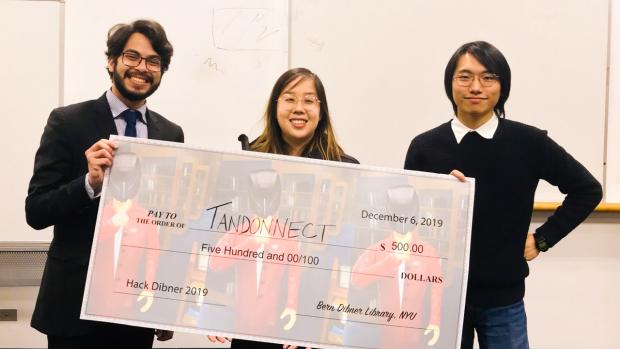Students “Hack Dibner” to improve library experience

Winning team members of the Hack Dibner competition: Vikram Sakkia, Michelle La, and Chengfeng Luo
Walking into a spacious, well-stocked library can be a transformative experience: the hushed atmosphere of productive study, the sense of intellectual curiosity ... yet few would argue that the experience always meets expectations. Whether it’s the occasional noisy patron or difficulty finding an unoccupied seat, those annoyances can mar even the most well-planned study session.
The annual “Hack Dibner” competition challenges NYU Tandon students to use technology to address such issues here at Dibner and other NYU libraries, and this year several teams came up with innovative solutions to the problems that most irked them.
The initiative kicked off on September 20, and throughout the semester participants attended workshops on ideation, project management, literature review, pitching, and other vital topics. Led by library mentors Lindsay Anderberg and Matthew Frenkel, the hackers learned the importance of using universal design principles and being data-driven, flexible, and willing to iterate.
By December 6, the day the competition entries were judged, several hacks had been prototyped and were ready to be assessed on the basis of their impact (20 points), feasibility (20 points), contextual inquiry and user experience (20 points), creativity (20 points), written proposal (10 points), and final pitch (10 points). (Teams who attended the workshops and consulted library mentors could also be awarded five bonus points for engagement and grit.)
It was a difficult decision for judges, but when the evening was over, Team Tandonnect had been declared the winner of the $500 first-place prize with a score of 96.6. Acknowledging how isolating it can feel to study alone, team members Michelle La, Chengfeng Luo, and Vikram Sakkia devised a digital app aimed at pairing like-minded students to form study groups and schedule meeting times. The goal went beyond just helping students excel academically, they said. “With NYU being comprised of commuter students, international students, and a wide variety of others, we see this as a way to support one another and build a cohesive community,” they explained.
With a score of 93.5, Team Hush earned the second-place prize of $250. Members Satish Reddy Bethi, Shubham Desai, and Zeru Zhang admitted to being annoyed by a noisy person from time to time while at Dibner — until they were admonished themselves one day for being too loud. “We hadn’t even been aware of our volume,” they recalled, “and it was really embarrassing to have it pointed out.” Hoping to save others from inadvertently committing a similar faux pas, they devised a silent alarm system that attaches to a table and flashes briefly when an unexpectedly loud sound is detected — an idea that impressed judges with its utility and sensitivity.
Thanks to those winning ideas, Dibner may soon be filled with lots more camaraderie and much less noise.




